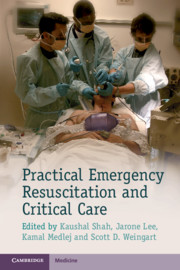Book contents
- Practical Emergency Resuscitation and Critical Care
- Practical Emergency Resuscitation and Critical Care
- Copyright page
- Contents
- Contributors
- Preface
- Abbreviations
- Section 1 General critical care
- Section 2 Trauma
- Section 3 Neurological emergencies
- Section 4 Cardiovascular emergencies
- Section 5 Respiratory emergencies
- Section 6 Gastrointestinal emergencies
- Section 7 Renal emergencies
- Section 8 Hematology–oncology emergencies
- Section 9 Infectious disease emergencies
- Section 10 Endocrine emergencies
- Section 11 Environmental emergencies
- 63 Anaphylaxis
- 64 Hyperthermia
- 65 Hypothermia
- 66 Overdoses
- Section 12 End of life
- Index
66 - Overdoses
from Section 11 - Environmental emergencies
Published online by Cambridge University Press: 05 November 2013
- Practical Emergency Resuscitation and Critical Care
- Practical Emergency Resuscitation and Critical Care
- Copyright page
- Contents
- Contributors
- Preface
- Abbreviations
- Section 1 General critical care
- Section 2 Trauma
- Section 3 Neurological emergencies
- Section 4 Cardiovascular emergencies
- Section 5 Respiratory emergencies
- Section 6 Gastrointestinal emergencies
- Section 7 Renal emergencies
- Section 8 Hematology–oncology emergencies
- Section 9 Infectious disease emergencies
- Section 10 Endocrine emergencies
- Section 11 Environmental emergencies
- 63 Anaphylaxis
- 64 Hyperthermia
- 65 Hypothermia
- 66 Overdoses
- Section 12 End of life
- Index
Summary
Keywords
- Type
- Chapter
- Information
- Practical Emergency Resuscitation and Critical Care , pp. 431 - 450Publisher: Cambridge University PressPrint publication year: 2013



